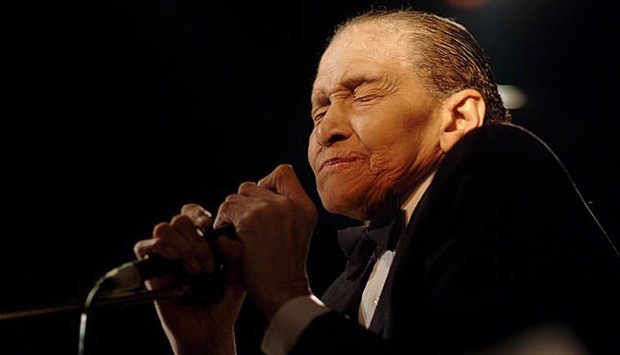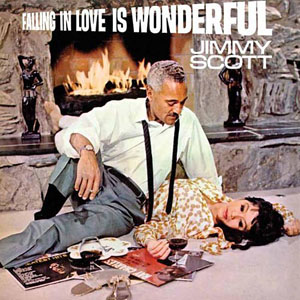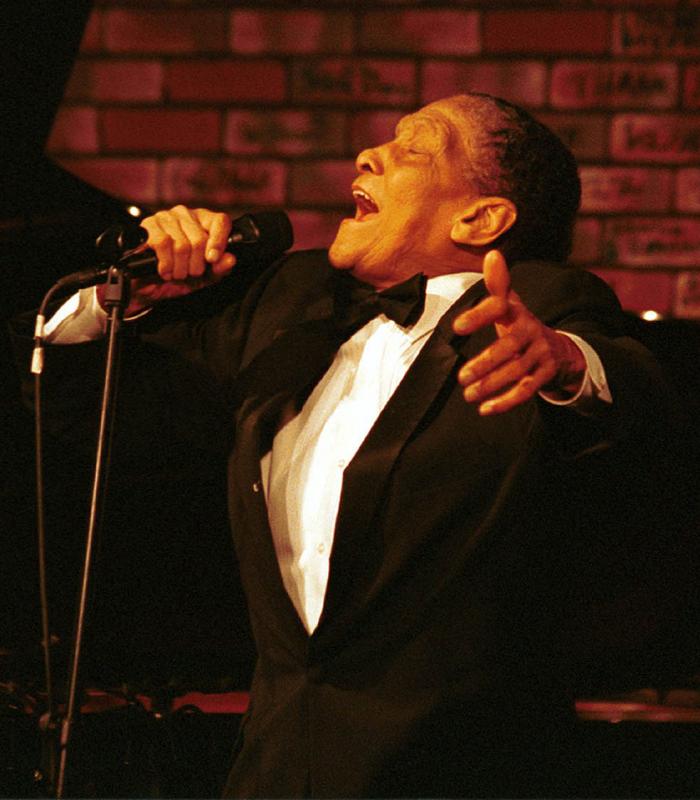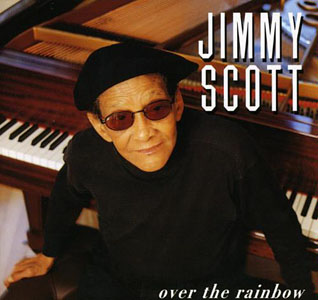Home » Jazz Articles » Interview » Jimmy Scott: Across the Universe
Jimmy Scott: Across the Universe

Study the material that you want to sing. Know what the story is in the material, so that you can portray it in your song
Now 86, Scott has seen more ups and downs than an investment banker. Born into a large family in Cleveland, he saw his mother injured in a fatal car accident when he was just 13. He turned inward, to an intense and intimate relationship with singing, in response. In his early teenage years, Scott learned he had Kallmann's Syndrome, a genetic disorder that affects the hypothalamus and as a result kept him from going through puberty. His voice would remain high and elusive, a bird quivering and luxuriating in each song's lyrics and beat. In David Ritz's Faith in Time: The Life of Jimmy Scott (De Capo Press, 2002), Ruth Brown described the first time she saw Scott perform, in the mid-1940s: "Like all the clubs back then, the joint was packed with pimps and hookers, rough guys and tough gals, and every sort of criminal you could name. But when this child got to singing, tears ran down the cheeks of cold-blooded killers. The room was frozen with respect for a true artist.
 "We'd already known we were witnessing the start of a genius generation," Brown continued. "Charlie Parker was flying; Dizzy Gillespie was coming on; Dinah Washington was killing; soon Sarah Vaughan would be scaring every singer in sight. But this little man would hold his own among the giants. His soul scorched you clean. By exposing his emotional insides, he exposed yours."
"We'd already known we were witnessing the start of a genius generation," Brown continued. "Charlie Parker was flying; Dizzy Gillespie was coming on; Dinah Washington was killing; soon Sarah Vaughan would be scaring every singer in sight. But this little man would hold his own among the giants. His soul scorched you clean. By exposing his emotional insides, he exposed yours."Scott fluttered between the jazz scenes in Cleveland, Newark, New York, and elsewhere, and caught his first big break in 1948 when he was hired by Lionel Hampton for Hampton's world-famous Orchestra featuring Illinois Jacquet, Johnny Griffin, and other jazz masters. Scott remained in royal jazz company for several years thereafter. One of his earliest recordings ("Embraceable You") features Charlie Parker in the ensemble, and, for a time, through the cousin of one of his wives, Scott was one of Billie Holiday's in-laws.
But even though Scott's balladry strongly influenced Marvin Gaye, Michael Jackson, Nancy Wilson, and many other subsequent hit makers, the music business never seemed to figure Scott out, and vice versa. In 1952, he released the single "I Won't Cry Anymore," but Tony Bennett's subsequent version became the hit.
Thanks to legal machinations by Savoy Records owner Herman Lubinsky, who claimed to hold Scott's rights through some long-forgotten document, his two finest albums weren't released until years after they were recorded: 1962's Falling in Love is Wonderful (Rhino), with Ray Charles as pianist and producer (for his own Tangerine Records), was eventually released forty years later; 1969's The Source, with a constellation of session aces (bassist Ron Carter, saxophonist David "Fathead" Newman, guitarists Billy Butler and Eric Gale, and pianist Junior Mance), produced by Joel Dorn for Atlantic Records, came out in two pieces in 1993 and 2002. Between 1975 and '92, except for a few recordings on his own vanity label, Scott was mostly silent.
He resurfaced almost inexplicably in 1992, with Carter and Newman once more on hand for All the Way (Sire). 1995's Dream (Warner Bros.) featured soloist Milt Jackson. Scott then teamed with bassist Flea of the Red Hot Chili Peppers for a duet on The Captain & Tennille's "Love Will Keep Us Together" for Lounge-a-Palooza (Hollywood Records, '97).
 More recently, Scott and producer Todd Barkan launched a quartet of albums for Milestone Records: Mood Indigo (2000); Over the Rainbow (2001); But Beautiful (2002), which opens with a heart-stopping rendering of "You Don't Know What Love Is" arranged by pianist Renee Rosnes and features "Please Send Me Someone to Love" by Scott's good friend Percy Mayfield; and Moon Glow (2003). In total, these sessions—with pianist Cyrus Chestnut, guitarist Joe Beck, trumpeter Wynton Marsalis and others—returned Scott to the company of new jazz royalty generations removed from where he began.
More recently, Scott and producer Todd Barkan launched a quartet of albums for Milestone Records: Mood Indigo (2000); Over the Rainbow (2001); But Beautiful (2002), which opens with a heart-stopping rendering of "You Don't Know What Love Is" arranged by pianist Renee Rosnes and features "Please Send Me Someone to Love" by Scott's good friend Percy Mayfield; and Moon Glow (2003). In total, these sessions—with pianist Cyrus Chestnut, guitarist Joe Beck, trumpeter Wynton Marsalis and others—returned Scott to the company of new jazz royalty generations removed from where he began.Through it all, Jimmy Scott simply continues to bare his soul through his voice.
All About Jazz: You will be performing in the UK in October (2011). Where will you be performing and for how many shows? Who will be accompanying you?
Jimmy Scott: So far, I'll be performing at St. Stephens Hall in Hampstead for two concerts on October 15 and October 16 with my band, The Jazz Expressions, directed by Hilliard Greene, my bassist, and featuring Alex Minasian on piano, Dwayne Broadnax on drums, and T.K. Blue on alto saxophone and flute. That's the group.
 AAJ: Have you ever performed in the UK before, or is this the first time?
AAJ: Have you ever performed in the UK before, or is this the first time? JS: Yes, I've performed there many times. May 2007 was my last performance in the UK. I performed at Ronnie Scott's and at The Roundhouse.
AAJ: Most discographies show your last album release as Moon Glow in 2003. What have you been doing in the time since passed?
JS: We've just completed an album that is scheduled for release in the fall. It is a dedication to my wife to thank her for her loyalty. It's about our love for each other. The music pertains to our lives together. It features jazz masters like James Moody and Kenny Barron playing on it also. I think I should let you know that—we have them as guests. I dedicated it to my wife, and since it was dedicated to her, I'll let her tell you more about it.
Jeanie Scott: It was recorded in June 2009. The original conception and hook to it, songs that Jimmy and I had picked out over the years that we wanted him to eventually do because they related to different incidents in our relationship, led us to give it the title I Remember You. There was a documentary filmed about the recording, to support it, and we believe they'll both be released simultaneously in the fall. There are some other guest artists on it too, like Joe Pesci and Dee Dee Bridgewater and Patti Austin and other people. So we're just waiting for it to come out. Also, Terry Gibbs plays vibraphone on it—the last time he played with Jimmy was when Jimmy recorded for Roost Records in 1951.
AAJ: Few singers can render tender and fragile emotion like Chet Baker. What did you think of Chet's singing, and do you think it has anything in common with the way that you sing?
JS: I respected Chet's singing always. My wife and I both listen to his old recordings, those that we can find. I thought and think he is one of the greats.
AAJ: What jazz musicians play(ed) in an instrumental style that most reminds you of your own vocal style?
JS: Lester Young. Ray Charles. David "Fathead" Newman. Definitely Lester Young.
AAJ: When you're all by yourself and feeling blue, what are your two or three favorite songs to sing?
JS: "When Did You Leave Heaven?" "Motherless Child" and "My Mother's Eyes." When I feel lonely, they come to my mind.
 AAJ: Having listened to you, Nancy Wilson sure makes a lot more sense.
AAJ: Having listened to you, Nancy Wilson sure makes a lot more sense. JS: Oh, good. Yeah, that's my honey. That's my little honey. She's quite an artist, yes, she is.
AAJ: Are there singers that you find yourself returning to and listening to over and over again?
JS: Many, many singers. One is Ray Charles, of course, and Billy Eckstine. I don't want to forget to remind you that there is an artist who I had a great fondness for, and that was Big Maybelle. She used to come into clubs at night when we worked together, and she would say, "I'm singing some of your songs tonight," and I'd say, "It's no big deal, baby. If you're singing it, sing it." And she could sing it; she was a singer. I have a great fondness for her. Tony Bennett is another one of my favorites, you know? Ruth Brown is another. Ruth and I met in Norfolk, Virginia. She was at a club where I worked after she and her group closed. What can I tell you about Ruth? She could sing and I admired her work and likewise I think she admired mine—she took of a song of mine and made her first hit from it, "So Long." Another favorite of mine was Dinah Washington. Oh, she was impeccable. What a star.
AAJ: Dinah Washington did some famous, and excellent, duets with Brook Benton. Have you ever recorded a duet with another singer, male or female?
JS: Not until the new, upcoming album. Joe Pesci came by while we were preparing it, and he sang a number or two with me. Dee Dee Bridgewater is on it too. Most people couldn't believe that Joe can sing like he sings. He's got a hell of a beautiful voice, and he's a good singer, yes he is.
AAJ: Another singer we really should ask you about is the powerful Nina Simone. Did you ever get the opportunity to speak with or perhaps share a stage with her?
JS: No, I hadn't. Never. And I would have loved to, had I had that opportunity. Unfortunately, life didn't let that happen.
AAJ: There's such a powerful emotional undertow to so much of your music. Are you a spiritual person?
JS: Am I a religious person? Yes.
AAJ: How do you get that to come out through yourself and into your music?
 JS: Hey, I mean, this is you! You're singing, or you're doing your act, or whatever it is, if it's in you, it's going to come out of you. I was raised in a religious family. My mother was the most spiritual person I've ever met: God came first. Then we came after. And she lived like that with us and she taught those things to us.
JS: Hey, I mean, this is you! You're singing, or you're doing your act, or whatever it is, if it's in you, it's going to come out of you. I was raised in a religious family. My mother was the most spiritual person I've ever met: God came first. Then we came after. And she lived like that with us and she taught those things to us.AAJ: You come from a large family. What advice would you give to a young couple just starting their own family?
JS: First of all, they must be faithful to each other and support each other in what they're doing. If they're struggling together, they have to support each other to advance and become successful in their marriage. Yeah, that's what I would say to them: Be faithful to each other and support each other.
AAJ: What advice would you give to a young singer just starting out?
JS: I would say, study the material that you want to sing. Know what the story is in the material, so that you can portray it in your song. A lot of singers don't think of that as an important issue, but it is.

AAJ: Is there any difference between singing the blues and singing jazz?
JS: No. They are both about life. Both have a depth in life. If you're singing it, you realize, "Oh, I've seen that somewhere," or, "Oh, I've been through that," and you realize it has been lived before. We recognize it as life.
AAJ: Finally, what message would you like to deliver to all your fans and supporters?
JS: All I can tell you is thank you all for being supportive in my life. Those of you who have supported any part of my life: My God, I must say thank you, and thank you, and thank you.
Selected Discography
Little Jimmy Scott, Falling in Love is Wonderful (Rhino, 2002)
Little Jimmy Scott, But Beautiful (Milestone, 2002)
Jimmy Scott, Mood Indigo (Milestone, 2000)
Little Jimmy Scott, Everybody's Somebody's Fool (Verve, 1999)
Little Jimmy Scott, Dream (Warner Bros., 1995)
Jimmy Scott, All the Way (Sire, 1992)
Photo Credits
Page 1: Clay Walker
Page 2: Hiroshi Nishikawa
Page 3: Courtesy of Jimmy Scott
< Previous
The Mancy of Sound
Comments
Tags
Jimmy Scott
Interview
Chris M. Slawecki
United States
RUTH BROWN
Bird
Dizzy
Dinah
Sarah
Lionel Hampton
Illinois Jacquet
Johnny Griffin
Billie Holiday
Michael Jackson
Nancy Wilson
Tony Bennett
Ray Charles
Ron Carter
David "Fathead" Newman
Billy Butler
Eric Gale
Junior Mance
Milt Jackson
Renee Rosnes
Percy Mayfield
CYRUS CHESTNUT
Joe Beck
wynton marsalis
The Jazz Expressions
Hilliard Green
Alex Minasian
Dwayne Broadnax
T.K. Blue
Ronnie Scott
James Moody
Kenny Barron
Dee Dee Bridgewater
Patti Austin
Terry Gibbs
Chet Baker
Lester Young
Billy Eckstine
Big Maybelle
Brook Benton
Nina Simone
For the Love of Jazz
 All About Jazz has been a pillar of jazz since 1995, championing it as an art form and, more importantly, supporting the musicians who create it. Our enduring commitment has made "AAJ" one of the most culturally important websites of its kind, read by hundreds of thousands of fans, musicians and industry figures every month.
All About Jazz has been a pillar of jazz since 1995, championing it as an art form and, more importantly, supporting the musicians who create it. Our enduring commitment has made "AAJ" one of the most culturally important websites of its kind, read by hundreds of thousands of fans, musicians and industry figures every month.





















